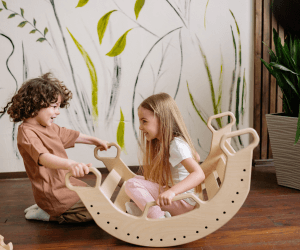
Get ahead with us
Subscribe to Viewofwomen daily updates and get latest stories delivered straight to your inbox

As children grow and develop, it is essential to provide them with opportunities for outdoor play. Outdoor play not only provides children with a fun, engaging experience, but it is also crucial for their physical, social, and emotional development.
Outdoor play is essential for children's physical health. It promotes active play, which helps improve a child's physical fitness, builds strong bones, and reduces the risk of obesity.
Physical Benefits of Outdoor Play
Playing outside can have a range of physical benefits for children. Here are some of the most important ones:
Development of gross motor skills
When children play outside, they have more space to move around and explore. This can help to develop their gross motor skills, which are the large muscle movements that are necessary for running, climbing, jumping and playing sports. Children who play outside are more likely to have better balance, coordination, and strength, which can help them in other areas of their lives too.
Cognitive Benefits of Outdoor Play
A. Enhancement of Problem-Solving Skills
Outdoor play provides children with opportunities to encounter problems and develop solutions on their own. They may encounter obstacles, such as figuring out how to climb a tree or cross a stream, which require them to use their problem-solving skills. By facing and overcoming these challenges, children develop their ability to think critically and creatively, which will benefit them throughout their lives.
B. Development of Creativity and Imagination
Outdoor play allows children to engage in imaginative play and explore their creativity. They may create their own games, make up stories, or pretend to be characters from their favourite books or movies. This kind of play not only fosters their imagination but also helps them develop their language and communication skills.
C. Improvement of Attention and Concentration
Research has shown that spending time in nature can improve attention and concentration in both children and adults. When children play outdoors, they are exposed to a wide range of sensory experiences, such as sights, sounds, and textures. This exposure helps to reduce stress levels and increase their ability to focus, which can benefit them academically and socially. Additionally, outdoor play allows children to engage in physical activity, which has been shown to improve attention and concentration. Outdoor play has several emotional benefits that can positively impact a child's mental health and well-being.
Here are some of the most significant benefits:
A. Reduction of stress and anxiety
One of the most significant benefits of outdoor play is its ability to reduce stress and anxiety. When children spend time outdoors, they are exposed to natural light, fresh air, and open spaces, all of which can help them feel more relaxed and calm. Additionally, outdoor play provides children with a chance to release pent-up energy, which can often manifest as stress or anxiety.
Environmental Benefits of Outdoor Play
Playing outdoors can have a profound impact on children's understanding and appreciation of nature. Here are some of the top environmental benefits of outdoor play:
A. Awareness and appreciation of nature
When children spend time outdoors, they engage in unstructured, imaginative play that encourages them to explore the natural world around them. Whether collecting rocks, observing insects or simply feeling the wind in their hair, outdoor play can help children develop a deep appreciation for the natural environment. This, in turn, can lead to a greater sense of respect and responsibility for the planet.
B. Encourages environmental responsibility and stewardship
Spending time outdoors can also help children develop a sense of responsibility for the environment. When they see firsthand the impact of littering or pollution on the natural world, they are more likely to understand the importance of taking care of the planet. This can lead to lifelong habits of recycling, conserving resources, and making sustainable choices.
C. Exposure to sustainable living practices
When children spend time outdoors, they are often exposed to sustainable living practices such as composting, gardening, and renewable energy sources. These experiences can help children understand the importance of reducing waste, conserving resources, and living harmoniously with the natural world. They may also inspire children to pursue careers in environmental science, conservation, or other fields that prioritize sustainability
After exploring the numerous benefits of outdoor play, it is clear that it is an essential component of a child's physical, mental, and emotional development. Outdoor play promotes healthy physical activity, strengthens social and cognitive skills, encourages creativity and imagination, and builds resilience and confidence. Moreover, being in nature can reduce stress and anxiety, improve mood, and foster a deeper connection with the natural world.
Given the benefits of outdoor play, it is crucial for parents, schools, and communities to prioritize this activity for children. Parents should embrace outdoor play by encouraging their children to spend time outside and providing safe and engaging outdoor spaces. Schools can also prioritize outdoor play by incorporating it into the curriculum and providing ample outdoor areas for activity and exploration.
Communities can support outdoor play by investing in parks and green spaces and creating safe spaces for children to play. By providing opportunities for children to engage in outdoor play, we can promote their physical, mental, and emotional well-being, and help them develop into healthy, happy, and resilient adults.
Leave a Reply